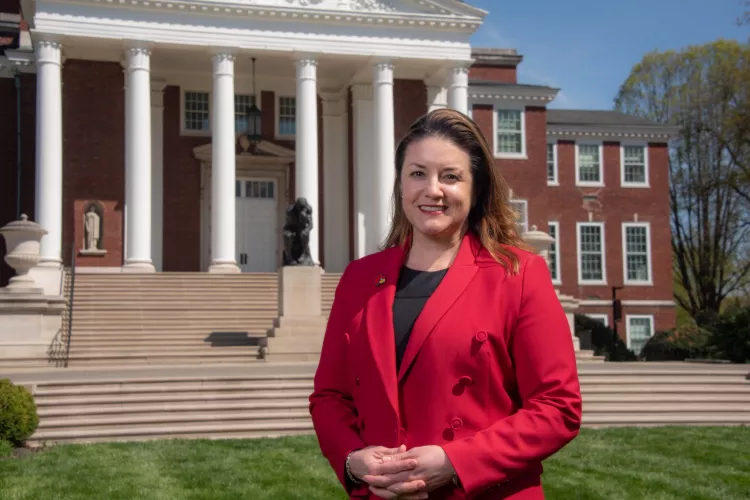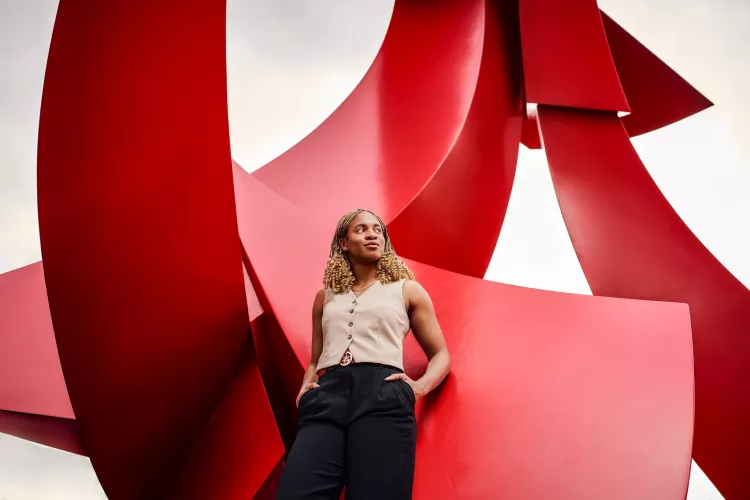Filling a gap with care
October 1, 2025
As a young child, Saadhavi Maskey sat upon his grandfather’s lap in the Nepali capital of Kathmandu, listening to stories about his career in medicine. He heard how his grandfather helped heal and teach others and marveled at the mystifying instruments used in his practice.
The University of Louisville senior recalls the experience with awe and reverence – but after growing up with a grandfather, mother and father who were all very busy physicians in various fields, he also recalls firmly deciding as a child, “I never want to do this with my life.”
But, as they so often do in life as one grows up, things changed.
“I never wanted to be a doctor. I wanted to be an artist or an innovator of some sort – to make inventions that will help people,” Maskey said. “But once I explored medicine a bit more, I saw there was a potential for innovation through research or creating new surgical techniques.”
But where to explore this budding interest? Maskey grew up in Lexington, Kentucky, and always planned to attend university there. But while testing the waters with other schools he received an email from UofL about its Cardinal OUTlook Day, an open tour for all prospective students that included a preview of LBGTQ+ life on campus. Maskey said of the dozens of schools he had researched, not one had offered anything like that. “The fact that the school came up with that for us was incredible. That was the event that put UofL on my radar.”
Maskey was further drawn to UofL by its registered student organizations (RSOs) and Prestigious Scholars programs, which he’s taken smart advantage of.
“When I saw their laundry list of opportunities … it kind of set in stone that UofL and Louisville was the place for me,” he said. His curriculum vitae now features a Brown Fellows Scholarship, a Fulbright US-UK Summer Institute Award and active participation in the G.E.M.S. (Guaranteed Entrance to Medical School) program and the Multicultural Association of Pre-Health Students (MAPS) RSO.
As a freshman, Maskey took inspiration from his own creative spirit and became an individualized major. The College of Arts and Sciences’ program, offered through the liberal studies department, gives undergraduates the freedom to craft their own personalized degree to fit their unique career goals. Maskey’s individualized major, health equity, encompasses traditional biology and chemistry studies to support his pre-medical coursework plus main concentrations in women’s, gender and sexuality studies, and LGBTQ health care studies to create a specialty focus he’s passionate about.
And Maskey’s specialty selection is not by accident. It runs in the family.
His parents each practice in care areas where they saw gaps – his mother as an infectious disease specialist focusing on HIV care and his father as a pulmonologist treating cancer. “Seeing them pick a little niche where they saw (a need) inspired me to do the same,” he said. “As someone who identifies with the LGBTQ+ community, I’ve experienced gaps in health care that I think could be filled easily – it just requires someone passionate about solving it.”
The LGBTQ+ community is not a monolith. The umbrella encompasses cisgender men and women. Transgender men and women. And many other people from varying identities, races, religions and more across a broad spectrum, each requiring informed and individualized care. It is for those reasons and more that Maskey chose his focus – and believes it is important for LGBTQ+ health care to spread far and wide rather than becoming the responsibility of providers who identify within the nuances of that minority group.
“Queer people are a minority,” Maskey said, “and medical providers within the community represent an even smaller minority. So, it’s very important that all providers feel confident and comfortable treating LGBTQ+ health issues.”
One way he’s facilitating knowledge as a UofL student is by forming and leading a MAPS committee on LGBTQ+ health care. Members meet once a semester to learn more about health issues affecting the community through panel discussions and professional speakers from the medical field.
“Doing this committee through MAPS exposes a lot more students to LGBTQ+ health care than they initially would be,” he said. “I can’t fix everything, so I focus on teaching the students around me.”
After graduation, Maskey will attend medical school – hopefully continuing his journey as a Cardinal thanks to the G.E.M.S. program. “A good thing about the program is that while they reserve a spot for you at the School of Medicine, their most important focus is making you a good health care provider wherever you go,” he said.
Maskey believes he’s found his medical niche in reconstructive surgery, a specialty that can intersect his passions of LGBTQ+ health care and plastic surgery by way of gender-affirming care for the trans community, which he said can positively transform aspects of their lives within a few short hours.
“I really see myself in the research and innovation of that, working to engineer those surgeries to their full capability,” he said, adding that through the technology of reconstructive plastic surgery “you have an artist’s eye.”
Through his personalized studies at UofL and well-laid plans for his future in medicine, Maskey said his personal – and shared – experiences here at UofL and beyond will continue to ignite his passions.
“Seeing these gaps firsthand drives me to want to fix everything I’ve experienced and seen. It’s almost hard to explain in words,” he said. “Because it’s more of an emotion.”
Related News






